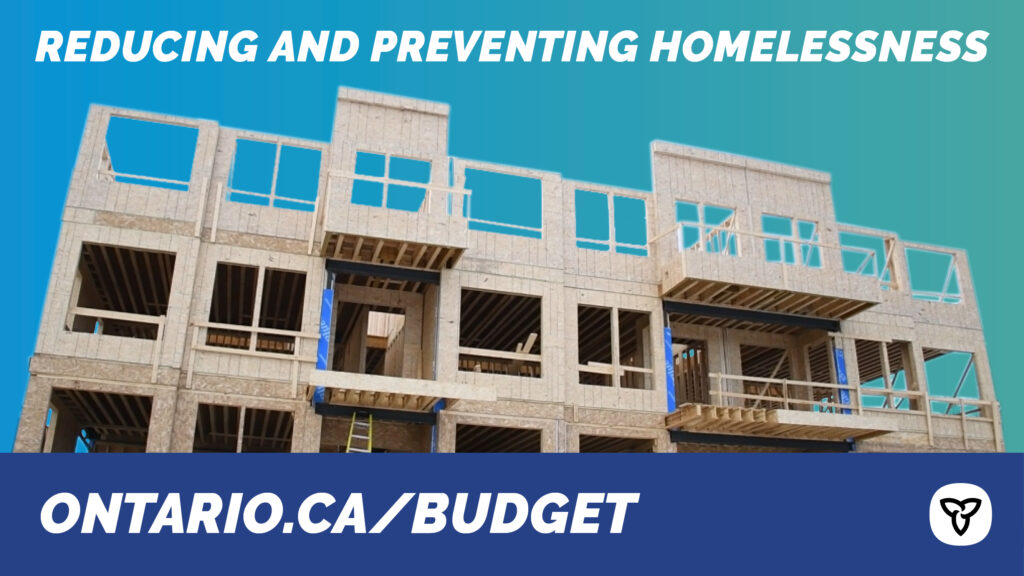Homelessness Prevention Support Increase for Bruce & Grey Counties
Province’s additional investment will help people at risk

April 13, 2023
OWEN SOUND– The Ontario government is investing an additional $202 million annually in the province’s Homelessness Prevention Program and Indigenous Supporting Housing Program, bringing Ontario’s total yearly investment in these programs to close to $700 million. The additional funding will help those experiencing or at risk of homelessness and support community organizations delivering supportive housing.
This additional funding includes:
- County of Bruce – $1,536,900 (increased by $599,400)
- County of Grey – $3,282,800 (increased by $1,237,200)
“This investment will make a real impact to support housing providers that help vulnerable people either at risk or already experiencing homelessness in our community,” said Bruce-Grey-Owen Sound MPP Rick Byers.
The additional funding, announced in the 2023 Budget, represents a 40 per cent increase in funding by the government to support the most vulnerable by providing supportive housing and homelessness prevention services. Under the $202 million, $190.5 million each year will be allocated to the Homelessness Prevention Program (HPP), which gives Ontario’s 47 Service Managers greater flexibility to allocate funding and make better use of existing resources to focus on delivering supports.
The remaining $11.5 million each year will be invested in the Indigenous Supportive Housing Program (ISHP), which provides Indigenous-led, culturally appropriate long-term housing solutions and support services to Indigenous people experiencing or at risk of homelessness.
“We know Ontario’s housing supply crisis impacts all Ontarians, no matter their background or budget,” said Steve Clark, Minister of Municipal Affairs and Housing. “That’s why we’ve increased funding for our homelessness prevention programs by more than 40 per cent. These measures complement the bold and transformational change we are implementing to tackle the housing supply crisis and get more homes built faster across Ontario.”
“During a time of economic challenges and change, our government is supporting those who have fallen on hard times and are experiencing, or are at risk of experiencing, homelessness,” said Peter Bethlenfalvy, Minister of Finance. “Ontario’s 2023 Budget: Building a Strong Ontario is the right plan to support those who need it the most today while laying a strong fiscal foundation for future generations.”
“The Homelessness Prevention Program and Indigenous Supporting Housing Program are important steps that our government is taking to support those experiencing or at risk of homelessness,” said Lisa Thompson, MPP for Huron-Bruce. “Through this investment, the most vulnerable, as well as our local communities, can have confidence in the access to needed supports.”
“Through strong partnerships and quality investment, Bruce County is able to build a strong housing response system for vulnerable residents,” said Bruce County Warden Chris Peabody. “Anyone that is homeless, or at risk of homelessness, is encouraged to contact local 211 services to secure a safe place to stay for the night, and learn about other services that may support residents in maintaining their current housing in Bruce County.”
“This funding announcement represents an increase of 60 percent over last year and is part of this Government’s strong commitment to investing in housing supports for our most vulnerable in these uncertain times,” said Simcoe-Grey MPP Brian Saunderson.
“Everyone deserves a safe and affordable place to call home,” said Grey County Warden Brian Milne. “Housing and homelessness prevention are a priority for Grey County, and this additional support for municipalities will help us work together to increase the supply of housing and tackle the homelessness crisis in Ontario.”
The increased funding is a result of a revised funding model that better reflects the current needs of individuals who are facing homelessness across Ontario. Funding dollars are being increased to address increased needs, particularly during a time of rising inflation, and to help ensure that no service manager receives a decrease in funding compared to 2022-23 as a result of the transition to the new model.
“Supportive housing provides people in need with a roof over their heads. It also connects them with services that provide a hand up to improve their circumstances, including mental health support and job training,” said Nina Tangri, Associate Minister for Housing. “Our government met with partners and stakeholders across the province this past fall – we heard their concerns and are addressing their valuable feedback to improve Ontario’s supportive housing system.
The changes also address the recommendation in the Auditor General’s 2021 value-for-money audit on homelessness, which called for a better funding model for homelessness programs that would target areas where funding is most needed.
Quick Facts